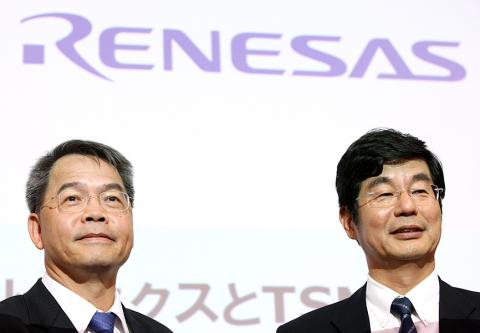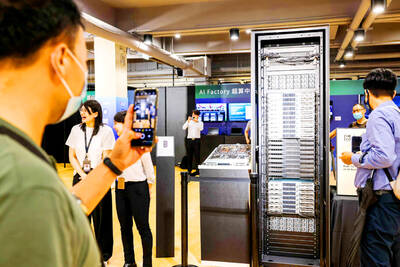Taiwan Semiconductor Manufacturing Co (TSMC, 台積電), the world’s biggest contract chipmaker, announced yesterday that it would expand collaboration with Japan’s loss-making Renesas Electronics Corp, in a bid to boost both companies’ microchip manufacturing technology and business.
TSMC and Renesas, the world’s biggest supplier of microcontroller chips for automobiles, yesterday signed an agreement to manufacture MCUs for Renesas, using 40 nanometer embedded flash (eFlash) process technology, according to a joint press release.
Renesas previously agreed that it would outsource MCUs to TSMC using 90 nanometer eFlash process technology.

Photo: Bloomberg
Under the agreement, TSMC will advance Renesas’ MONOS (Metal-Oxide-Nitride-Oxide-Silicon) technology to 40 nanometer process to make MCUs that are used in next-generation automotive and consumer applications such as home appliances, a public relations official at TSMC said by telephone.
However, he declined to comment on whether Renesas would outsource more MCUs to TSMC.
“Renesas is one of the leaders in the MCU market and the collaboration will help deliver the performance Renesas needs for new production introduction with the level of quality and reliability its customers have come to expect,” Jason Chen (陳俊聖), TSMC’s senior vice president of worldwide sales and marketing, said in the press release.
Renesas had been under constant pressure to invest heavily in waging a technological war against emerging overseas rivals to produce smaller and more powerful chips at lower prices, according to recent media reports. The company lost ¥62.6 billion (US$785 million) in the year to March.
At 40 nanometer process, MCU products could achieve higher speed, lower power consumption and more than 50 percent smaller die size compared with the current 90 nanometer node, according to the news release. Furthermore, by making the MONOS process platform available to other semiconductor suppliers around the world (including fabless companies and IDMs), Renesas and TSMC aim to set up an ecosystem and further widen the customer base, the two companies said.
Renesas senior vice president Shinichi Iwamoto said the move to its rival would see more efficient and flexible production, making it easier to match fast-changing customer demand. However, he did not comment on reports the company would cut about 14,000 jobs, or 30 percent, of its workforce as part of a major restructuring.
“We acknowledge the need for job cuts, though nothing has been decided,” he told reporters in Tokyo yesterday.
He also declined to comment on an earlier story in the Nikkei Shimbun that said it planned to raise ¥100 billion, mainly from its top shareholders, NEC Corp, Hitachi Ltd and Mitsubishi Electric Corp.
Renesas may sell some of its 19 production plants in Japan, including one in Tsuruoka, Yamagata Prefecture, the Yomiuri Shimbun reported on Sunday after saying last week the company plans an alliance with TSMC.
Lin Cheng-ming (林振銘), a director in charge of specialty technology at TSMC, who also met reporters yesterday in Tokyo, declined to comment whether the company is considering a plant from Renesas.
Japan’s microchip industry has struggled amid a strong yen and fierce competition, especially from South Korean and Taiwanese rivals, while manufacturers were also hit by last year’s quake and tsunami disaster.
In Tokyo trading, shares of Renesas tumbled 10.62 percent yesterday to ¥244 after hitting an all-time low of ¥238 earlier in the day.
Shares of TSMC closed 2 percent higher at NT$81.6 in Taipei.

LIMITED IMPACT: Investor confidence was likely sustained by its relatively small exposure to the Chinese market, as only less advanced chips are made in Nanjing Taiwan Semiconductor Manufacturing Co (TSMC, 台積電) saw its stock price close steady yesterday in a sign that the loss of the validated end user (VEU) status for its Nanjing, China, fab should have a mild impact on the world’s biggest contract chipmaker financially and technologically. Media reports about the waiver loss sent TSMC down 1.29 percent during the early trading session yesterday, but the stock soon regained strength and ended at NT$1,160, unchanged from Tuesday. Investors’ confidence in TSMC was likely built on its relatively small exposure to the Chinese market, as Chinese customers contributed about 9 percent to TSMC’s revenue last

With this year’s Semicon Taiwan trade show set to kick off on Wednesday, market attention has turned to the mass production of advanced packaging technologies and capacity expansion in Taiwan and the US. With traditional scaling reaching physical limits, heterogeneous integration and packaging technologies have emerged as key solutions. Surging demand for artificial intelligence (AI), high-performance computing (HPC) and high-bandwidth memory (HBM) chips has put technologies such as chip-on-wafer-on-substrate (CoWoS), integrated fan-out (InFO), system on integrated chips (SoIC), 3D IC and fan-out panel-level packaging (FOPLP) at the center of semiconductor innovation, making them a major focus at this year’s trade show, according

DEBUT: The trade show is to feature 17 national pavilions, a new high for the event, including from Canada, Costa Rica, Lithuania, Sweden and Vietnam for the first time The Semicon Taiwan trade show, which opens on Wednesday, is expected to see a new high in the number of exhibitors and visitors from around the world, said its organizer, SEMI, which has described the annual event as the “Olympics of the semiconductor industry.” SEMI, which represents companies in the electronics manufacturing and design supply chain, and touts the annual exhibition as the most influential semiconductor trade show in the world, said more than 1,200 enterprises from 56 countries are to showcase their innovations across more than 4,100 booths, and that the event could attract 100,000 visitors. This year’s event features 17

Hon Hai Precision Industry Co (鴻海精密), which assembles servers for Nvidia Corp, yesterday said that revenue last month rose 10.61 percent year-on-year, driven by strong growth in cloud and networking products amid continued front-loading orders for artificial intelligence (AI) server racks. Consolidated revenue expanded to NT$606.51 billion (US$19.81 billion) last month from NT$548.31 billion a year earlier, marking the highest ever in August, the company said in a statement. On a monthly basis, revenue was down 1.2 percent from NT$613.86 billion. Hon Hai, which is also a major iPhone assembler, added that its electronic components division saw significant revenue growth last month, boosted